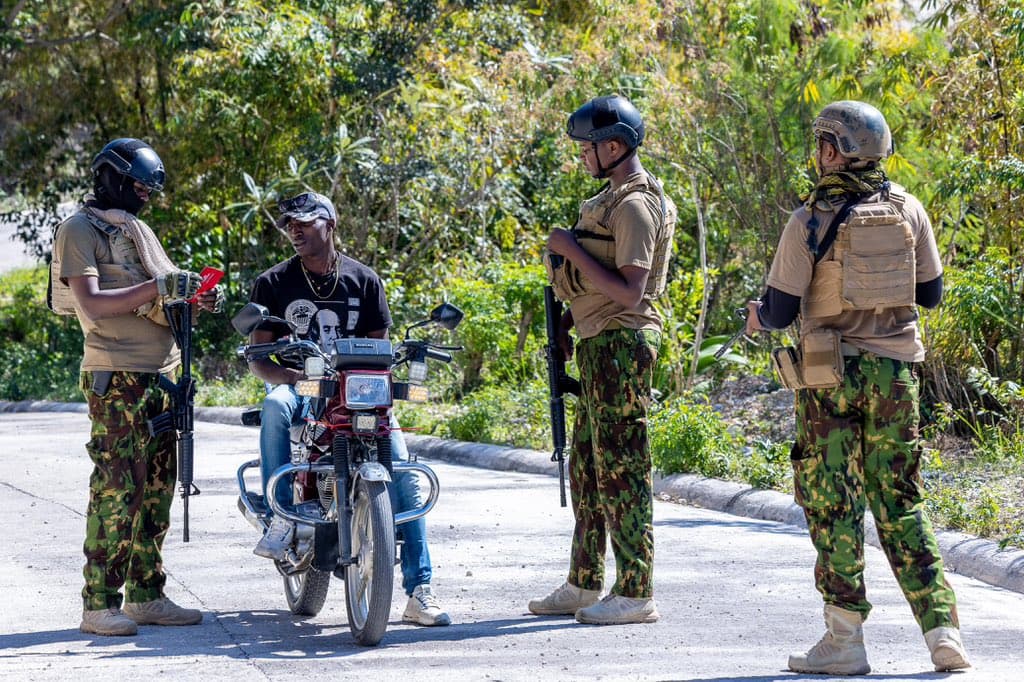We're loading the full news article for you. This includes the article content, images, author information, and related articles.
Former Cabinet Secretary Moses Kuria has welcomed the UN Security Council's decision to transition the Kenya-led Multinational Security Support (MSS) mission in Haiti into a new Gang Suppression Force (GSF), terming Kenya's previous involvement a 'misadventure.'

Former Cabinet Secretary Moses Kuria has lauded the United Nations Security Council (UNSC) for adopting Resolution 2793, which transitions the Kenya-led Multinational Security Support (MSS) mission in Haiti into a new, more robust Gang Suppression Force (GSF). Kuria, a vocal critic of Kenya's involvement, described the earlier mission as a "misadventure." The resolution, passed on Tuesday, October 1, 2025, effectively concludes Kenya's leadership role in the Caribbean nation's security efforts.
The UNSC's decision, supported by 12 member countries with three abstentions (China, Russia, and Pakistan), authorizes the GSF for an initial period of 12 months under Chapter VII of the UN Charter. This new force is designed to be more lethal and significantly larger, with an authorized personnel ceiling of 5,550 uniformed personnel, comprising both military and police, and 50 civilians.
Kenya initially volunteered to lead the MSS mission in Haiti in October 2023, pledging to send 1,000 police officers. The deployment was aimed at assisting the Haitian National Police in combating rampant gang violence that had plunged the country into a severe humanitarian and security crisis. At the time, Kenya's Ministry of Foreign Affairs stated that the mission was not only about peace and security but also about the rebuilding of Haiti's politics, economic development, and social stability.
However, the MSS mission, whose mandate expired on Thursday, October 2, 2025, faced significant challenges. President William Ruto acknowledged at the UN General Assembly that the mission had been "underfunded, underequipped and operated below 40 percent of its authorized personnel strength." Despite these constraints, the mission reportedly restored some access to key areas, such as the Port-au-Prince airport.
The transition to the GSF marks a significant shift in the international community's approach to Haiti's security crisis. The new resolution grants a stronger, more offensive, and operational mandate to the force, acknowledging that the scale and sophistication of the threat from gangs far exceeded the initial mandate of the MSS.
Domestically, Kenya's involvement faced legal hurdles. A Kenyan High Court decision in January 2024 deemed the order to deploy police officers to Haiti unconstitutional, with an appeal still pending. There were also concerns regarding the funding of the mission, with initial assurances that no taxpayer money would be used. However, Treasury records later revealed that the Kenyan government had spent KSh 2.1 billion on the mission.
Moses Kuria, formerly the Cabinet Secretary for Public Service, Performance, and Delivery Management, expressed his relief at the UN's decision. He urged Inspector General of Police Douglas Kanja to redeploy the returning Kenyan officers to Nairobi's streets to address rising insecurity, specifically mentioning "daylight muggings and pickpocketings."
The Ministry of Foreign and Diaspora Affairs, in a statement on Wednesday, October 1, 2025, welcomed the new resolution, affirming Kenya's commitment to continue working with the UN and stakeholders to promote peace and stability in Haiti. The Ministry also highlighted Kenya's leadership as a demonstration of African states' ability to guide the international community in times of crisis.
The United States, which co-sponsored the resolution for the GSF with Panama, hailed the vote as offering new hope for Haiti's future. US Ambassador Michael Waltz noted that the increased size of the force demonstrated that the international community was sharing the burden.
While the new GSF offers a more robust approach, concerns remain about its funding and operational effectiveness. Contributions to the GSF will continue to be voluntary, raising questions about sustained financial support. The previous MSS mission struggled with funding, limited equipment, and minimal personnel.
The transition also highlights the challenges of international interventions in complex security environments, particularly when political stability and adequate resources are lacking. The future role of Kenya within the new GSF remains unclear, as the resolution does not specify which countries have committed to deploying troops or the new force's exact cost.
The precise timelines for the deployment of the new Gang Suppression Force have not yet been announced. Additionally, the specific commitments of military and police troops from various nations, beyond the authorized personnel ceiling, are still unknown. The full financial implications for Kenya, beyond the already spent KSh 2.1 billion, also remain to be seen, particularly concerning any potential reimbursements from the UN.
Observers will be closely watching the deployment schedule and the composition of the new Gang Suppression Force. The commitment of member states to provide personnel and funding will be crucial for the GSF's success. Furthermore, the impact of the GSF on Haiti's security situation and its ability to facilitate long-delayed elections will be a key indicator of its effectiveness.
The UN Security Council's decision follows ongoing international efforts to address the escalating crisis in Haiti, which has seen a surge in gang-related violence since the assassination of President Jovenel Moïse in 2021. The situation has led to widespread displacement and a severe humanitarian crisis.
Keep the conversation in one place—threads here stay linked to the story and in the forums.
Sign in to start a discussion
Start a conversation about this story and keep it linked here.
Other hot threads
E-sports and Gaming Community in Kenya
Active 9 months ago
The Role of Technology in Modern Agriculture (AgriTech)
Active 9 months ago
Popular Recreational Activities Across Counties
Active 9 months ago
Investing in Youth Sports Development Programs
Active 9 months ago